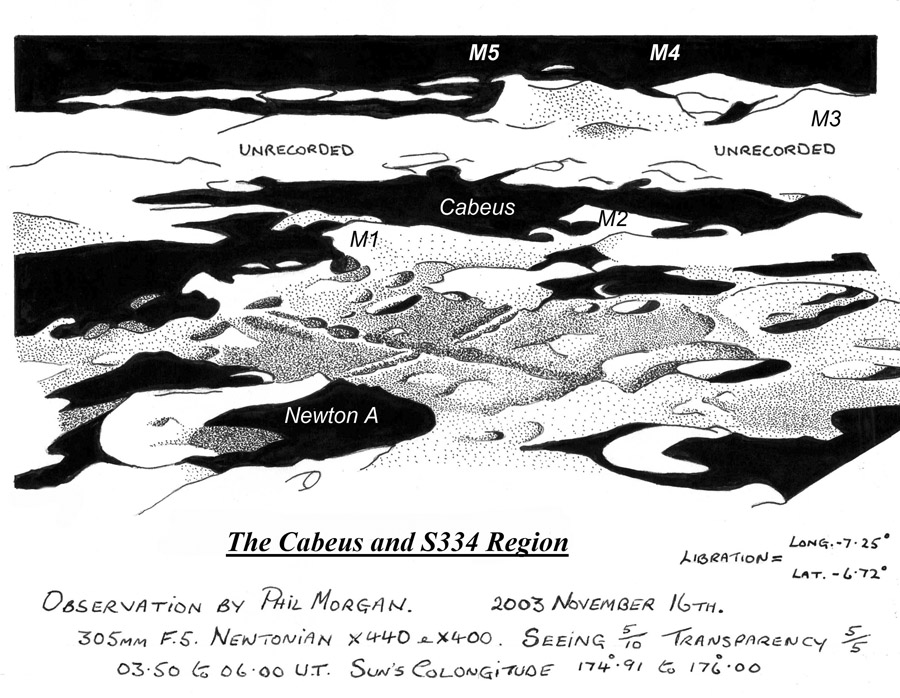Difference between revisions of "July 6, 2009"
| Line 3: | Line 3: | ||
<!-- ws:start:WikiTextHeadingRule:2:<h1> --> | <!-- ws:start:WikiTextHeadingRule:2:<h1> --> | ||
<!-- ws:start:WikiTextLocalImageRule:8:<img src="/file/view/LPOD-July6-09.jpg/80349935/LPOD-July6-09.jpg" alt="" title="" /> -->[[File:LPOD-July6-09.jpg|LPOD-July6-09.jpg]]<!-- ws:end:WikiTextLocalImageRule:8 --><br /> | <!-- ws:start:WikiTextLocalImageRule:8:<img src="/file/view/LPOD-July6-09.jpg/80349935/LPOD-July6-09.jpg" alt="" title="" /> -->[[File:LPOD-July6-09.jpg|LPOD-July6-09.jpg]]<!-- ws:end:WikiTextLocalImageRule:8 --><br /> | ||
| − | <em>drawing by [mailto:philip.morgan@talktalk.net | + | <em>drawing by [mailto:philip.morgan@talktalk.net Phil Morgan]</em><br /> |
<br /> | <br /> | ||
The sketch above shows my attempt to depict the Cabeus region of the Moon under a very favourable southwesterly libration. At the best of times this is one of the most difficult and challenging of regions to portray successfully, and even after some 2 hours at the eyepiece I was unable to finish some parts of my drawing beyond Cabeus. The peaks lettered M1 to M5 were so named by Ewen Whitaker nearly 60 years ago, the loftiest being M4 and M5 with heights of 20,000 and 30,000 ft respectively being quoted by Whitaker, who surmised that these were probably the loftiest peaks on the visible face of the Moon. As shown on this occasion, M5 often has the appearance of a summit crater. The lower ground (unrecorded) between these peaks and Cabeus was often called the ‘dark plains region’ by the late Harold Hill. Much of his observational career was spent studying and mapping these regions. Commencing just north of M1 a wide deep crater valley runs towards the prominent bowl crater Newton E. The famous German selenographer Schmidt noted this feature, and he lettered it S.334 in his list of interesting objects. Crossing S.334 diagonally, and running from Newton A up into Cabeus A with craterlike enlargements is a much narrower valley. This can be quite a prominent feature under sunrise conditions.<br /> | The sketch above shows my attempt to depict the Cabeus region of the Moon under a very favourable southwesterly libration. At the best of times this is one of the most difficult and challenging of regions to portray successfully, and even after some 2 hours at the eyepiece I was unable to finish some parts of my drawing beyond Cabeus. The peaks lettered M1 to M5 were so named by Ewen Whitaker nearly 60 years ago, the loftiest being M4 and M5 with heights of 20,000 and 30,000 ft respectively being quoted by Whitaker, who surmised that these were probably the loftiest peaks on the visible face of the Moon. As shown on this occasion, M5 often has the appearance of a summit crater. The lower ground (unrecorded) between these peaks and Cabeus was often called the ‘dark plains region’ by the late Harold Hill. Much of his observational career was spent studying and mapping these regions. Commencing just north of M1 a wide deep crater valley runs towards the prominent bowl crater Newton E. The famous German selenographer Schmidt noted this feature, and he lettered it S.334 in his list of interesting objects. Crossing S.334 diagonally, and running from Newton A up into Cabeus A with craterlike enlargements is a much narrower valley. This can be quite a prominent feature under sunrise conditions.<br /> | ||
<br /> | <br /> | ||
| − | <em>[mailto:philip.morgan@talktalk.net | + | <em>[mailto:philip.morgan@talktalk.net Phil Morgan]</em><br /> |
<br /> | <br /> | ||
<strong>Technical Details</strong><br /> | <strong>Technical Details</strong><br /> | ||
Revision as of 19:00, 17 January 2015
Loftiest Peaks?

drawing by Phil Morgan
The sketch above shows my attempt to depict the Cabeus region of the Moon under a very favourable southwesterly libration. At the best of times this is one of the most difficult and challenging of regions to portray successfully, and even after some 2 hours at the eyepiece I was unable to finish some parts of my drawing beyond Cabeus. The peaks lettered M1 to M5 were so named by Ewen Whitaker nearly 60 years ago, the loftiest being M4 and M5 with heights of 20,000 and 30,000 ft respectively being quoted by Whitaker, who surmised that these were probably the loftiest peaks on the visible face of the Moon. As shown on this occasion, M5 often has the appearance of a summit crater. The lower ground (unrecorded) between these peaks and Cabeus was often called the ‘dark plains region’ by the late Harold Hill. Much of his observational career was spent studying and mapping these regions. Commencing just north of M1 a wide deep crater valley runs towards the prominent bowl crater Newton E. The famous German selenographer Schmidt noted this feature, and he lettered it S.334 in his list of interesting objects. Crossing S.334 diagonally, and running from Newton A up into Cabeus A with craterlike enlargements is a much narrower valley. This can be quite a prominent feature under sunrise conditions.
Phil Morgan
Technical Details
See notes below drawing
Related Links
Rükl plate 73



